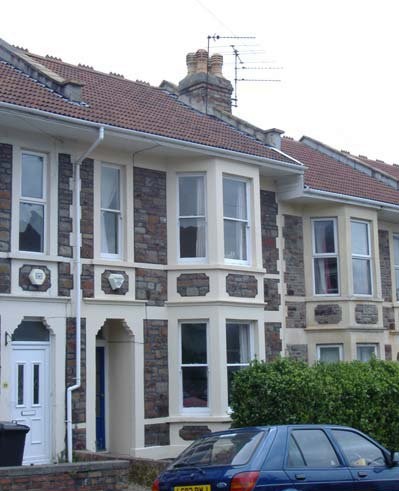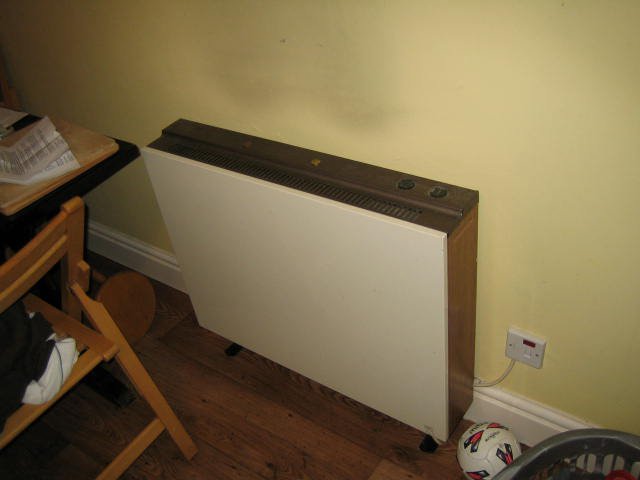

BCC 2-04 August 2007
COLD
Persons aged 65 years or over
None
EXCESS
Vulnerable age
Related hazards
HHSRS GUIDANCE 2006
Multiple locations
Yes
No
Secondary hazards
Yes
No
Storage Heater in front reception room
Front Elevation
DESCRIPTION OF HAZARDS
Dwelling:
Pre 1920 two-storey, mid terraced, house
Background: This is a traditionally constructed house of pennant stone walls under a clay tiled roof. It is a
good state of repair and free from any significant dampness. It comprises two reception rooms, a kitchen and
bathroom on the ground floor and three bedrooms on the first floor. All windows are single glazed (the
majority are double hung, sliding sashes) but are in a good repair and not excessively draughty. The loft
space is insulated with 200mm of glass fibre quilt. Heating is provided to all rooms (with the exception of the
kitchen) and in the ground floor hallway by electric night storage heating run off an economy tariff. The
storage heaters are around 12 years old and in good working order but do not have an additional "convector
boost" or dual heat facility. The current occupant has identified that they produce little heat in the evenings
and none at night even if they are set to low output during the day.
LIST OF RELEVANT MATTERS
LIKELIHOOD & OUTCOMES
a
Thermal Insulation
-
Compounding matters
- none
b
Dampness
-
c
Settling of insulation
-
Key
3
Seriously defective
d
Type of heating provision
1
2
Defective
e
Size of heating provision
-
1
Not satisfactory
f
Installation & maintenance
-
-
Satisfactory/NA
of heating system
-
g
Controls to heating system
1
h
Amount of ventilation
-
I
Disrepair to ventilation
-
j
Draughts
-
Score: 3274
RATING
E
A B C D
Average likelihood, outcomes and HHSRS score for hazards from excess cold for all persons
aged 65 years or over in a Pre-1920 Non HMO,1997-99.
NEW RATING
Av: Nos
Score: 327
F G H
I
J
BCC 2-04 August 2007
HEALTH AND SAFETY RATING SYSTEM SCORES
1 in 100
LIKELIHOOD
Low
High
Av: Pre-1920 Non Hmo: 330
< 4200 2400 1300 750 420 240 130
75
42
24
13
7.5
4
2.5
1.5 >
Justification: The original single glazed windows, although in good repair, will still allow some draughts and
heat loss. On the positive side, the property is mid-terraced, and provided with a reasonable standard of loft
insulation. Althouh there is heating provision in all of the main spaces used as habitable rooms, the charge
period asociated with economy tariffs and high static heat losses associated with these heaters means that
there will be inadequate heating in the evenings and early mornings. At these times the house has a higher
likelihood than average of becoming unhealthily cold in winter without the use of supplementary heating. The
likelihood of an occurrence resulting in harm to an elderly occupier over a 12 month period is increased from
the national average.
OUTCOMES
Class I
< 0.05
Class II
< 0.05
Class III
< 0.05
Class IV
< 0.05
%
Av: Pre-1920 Non Hmo: 34.0
31.6
0.15 0.3
0.7
1.5
3
7
15
26
38 >
Av: 6.0
4.6
0.15 0.3
0.7
1.5
3
7
15
26
38 >
Av: 18.0
21.5
0.15 0.3
0.7
1.5
3
7
15
26
38 >
Av: 42.0
42.3
0.15 0.3
0.7
1.5
3
7
15
26
38 >
RATING SCORES AFTER IMPROVEMENT
IMPROVE
Likelihood to
1 in
1000
Outcomes to
31.6 4.6 21.5 42.3
%
Justification: Converting to a split tariff with a late afternoon top up charge, could result in the heating
system providing heat in the evening period, but such tariffs are frequently unavailable. Thus a satisfactory
reduction in the likelihood of harm would only be achieved by installation of full gas central heating system
with programmable controls. Secondary glazing would further reduce heat losses and the likelihood of harm
to well below the national average.
Av:1,066
Justification: There is nothing to suggest that the harm outcomes will differ from the national averages
Av. Pre-1920 Non HMO:1,066
C D E
F G H
I
J
A
B